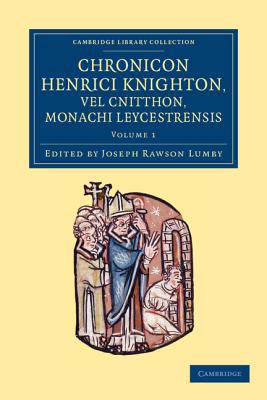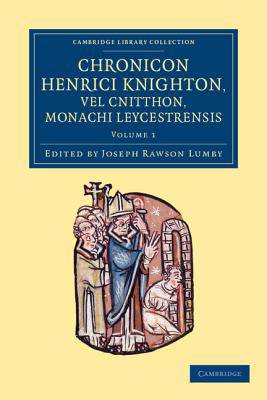
Bedankt voor het vertrouwen het afgelopen jaar! Om jou te bedanken bieden we GRATIS verzending (in België) aan op alles gedurende de hele maand januari.
- Afhalen na 1 uur in een winkel met voorraad
- Gratis thuislevering in België vanaf € 30
- Ruim aanbod met 7 miljoen producten
Bedankt voor het vertrouwen het afgelopen jaar! Om jou te bedanken bieden we GRATIS verzending (in België) aan op alles gedurende de hele maand januari.
- Afhalen na 1 uur in een winkel met voorraad
- Gratis thuislevering in België vanaf € 30
- Ruim aanbod met 7 miljoen producten
Zoeken
Chronicon Henrici Knighton Vel Cnitthon, Monachi Leycestrensis - Volume 1
Henry Knighton
€ 111,45
+ 222 punten
Omschrijving
This two-volume work was published as part of the Rolls Series between 1889 and 1895. A history of England, it deals principally with the period from 1066 until the death of author Henry Knighton around 1396. An introductory section of material largely drawn from Ranulf Higden adds what Knighton describes as necessary context to the recounting of the Norman Conquest. Volume 1 covers the period up to 1336, just before the start of the Hundred Years' War. It begins with the last century of Anglo-Saxon rule - an age of murders, treachery and 'evil times' - and covers the Norman period and the Plantagenets, culminating in the murder of Edward II. As editor, Joseph Rawson Lumby (1831-95) has been criticised for oversights, errors and omissions. Nevertheless, his detailed contents and marginalia make the Latin text more accessible to the modern reader.
Specificaties
Betrokkenen
- Auteur(s):
- Uitgeverij:
Inhoud
- Aantal bladzijden:
- 544
- Taal:
- Engels
- Reeks:
Eigenschappen
- Productcode (EAN):
- 9781108053402
- Verschijningsdatum:
- 15/11/2012
- Uitvoering:
- Paperback
- Formaat:
- Trade paperback (VS)
- Afmetingen:
- 152 mm x 229 mm
- Gewicht:
- 789 g

Alleen bij Standaard Boekhandel
+ 222 punten op je klantenkaart van Standaard Boekhandel
Beoordelingen
We publiceren alleen reviews die voldoen aan de voorwaarden voor reviews. Bekijk onze voorwaarden voor reviews.









